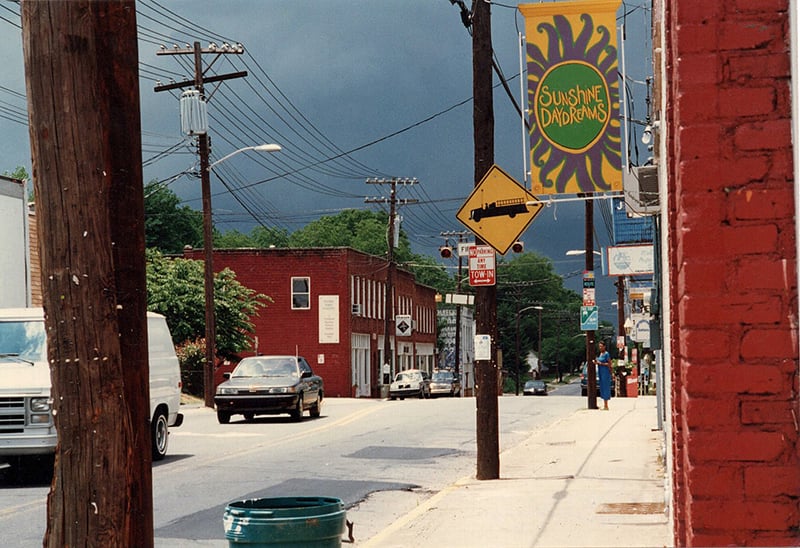Dr. J. Michael Bitzer: The Professor on Speed Dial
When reporters need North Carolina election analysis, they call him. So how did this bow tie-wearing, statistics-loving, Southern politics-following academic from Clemson become everybody’s go-to source?
The call comes in a few minutes after 3 p.m. on a Thursday. In the provost’s office, on the second floor of the century-old administration building at Catawba College in Salisbury, Dr. J. Michael Bitzer—a 47-year-old political science professor wearing tortoise-shell glasses, a starched blue Oxford shirt, and rainbow-striped bow tie—swivels behind a desk cluttered with paperwork.
If the bow tie fits: Dr. J. Michael Bitzer has settled into a role as one of the most reliable political experts in the region.
Artifacts crowd the walls around him. On one hangs a framed replica of the Revolutionary War-era South Carolina Moultrie Flag, a white crescent moon on a navy background with the word “LIBERTY” underneath. On another is a framed print with an outline of the Southern states under bold black capital letters: “OLD SOUTH.” The word “NEW” is superimposed in gold atop the “OLD.”
To take the call, Bitzer has to interrupt a deep discussion with a reporter about the Clemson-Georgia football rivalry, another historic war between states.
On the line is Tom Bullock, another reporter, for WFAE-FM, Charlotte’s National Public Radio station. Bullock wants some analysis of the upcoming first debate between United States Senator Kay Hagan and North Carolina House Speaker Thom Tillis, opponents in the heated and crucial election this fall. Bitzer is the source Charlotte media usually turn to for cogent, impartial political analysis. Lately, as Election Day nears and the Hagan-Tillis race dominates political coverage in the state and beyond, he’s fielding these types of calls four or five times a day.
“I’m gonna be coming to you basically for the lay of the land,” Bullock says, setting the scene before he starts recording. “Where we stand now.”
“OK.”
“Give me the nut ’graph, basically the summary statement, of what your latest blog post says.” Bitzer writes weekly posts on politics for the station’s website.
“Well, the big question for both campaigns is who is ultimately going to show up this fall,” Bitzer says. “What we’ve got is basically a 45-45 split in the public polls, and everybody basically has this as a coin-toss election. But if you look historically at midterm elections in North Carolina, you can kind of see a pattern where, one, unaffiliated voters do not show up at the same rate in terms of voter turnout like partisans do, and two, the electorate generally tends to skew more Republican than it does in a presidential year … ” He predicts that Tillis will win a close contest.
This is not titillating stuff when read on the page. It goes down smoother when Bitzer says it. The voice helps: resonant, mid-range, with just enough of an upstate South Carolina accent to stave off any tweedy professorial tone. Bitzer delivers his answer deliberately, not quite in a sing-song, but with some distinct modulation: “Well, the BIG question for BOTH campaigns is (pause) who is ultimately going to show up this fall …” His college mentor, a theater professor, taught him how to deliver lines to an audience—emphasizing certain words, pulling back on others, minding his timing. His knowledge of things such as voter turnout over election cycles makes him a good source of information, but his ability to translate these things into digestible nuggets keeps him on reporters’ and producers’ contact lists.
Bitzer’s isn’t the only voice out there—UNC Charlotte political science professors Greg Weeks and Eric Heberlig are common sources, as well, mainly for print media—but Bitzer’s public profile is higher than anyone else’s, especially for radio and local TV stations. In the past two years, as North Carolina politics has become a national story, publications such as The New York Times, The Washington Post, and Politico have turned to Bitzer as a source for understanding the dynamics at work in the state—especially for the all-important Hagan-Tillis election, which could determine the balance of power in the Senate.
The attention has been gratifying and a bit befuddling for a guy from small-town South Carolina who says that when he started his career, he’d have been happy teaching and doing research on things such as demographic shifts and voting blocs in Southern cities. But he enjoys it. “I see it as part of being an educator,” he says. “This is a service I provide.”
Of course, like any performer, he enjoys that part, too. He’s one of a new breed of young political scientists who combine the rigors of academic research with internet- and social media-based public outreach. Bitzer has presented a paper titled “Delegation in the Devolution Era: An Analysis of 3 State Legislatures and Bureaucratic Discretion in Health and Welfare Policy,” and he’s tapped out 33,000 tweets, some referencing The Simpsons. Bitzer balances his roles as serious academic and talking head, public figure and bow-tied caricature, and as an analyst on a subject plenty of people don’t want to hear about, from him or anyone else.
So far, he’s managed to keep from stumbling.
“It’s interesting to me,” Bullock, the WFAE reporter, says after Bitzer’s first answer, “because the way you’re describing it, it seems to make sense, from everything I’ve read.”
“Well, that’s a good thing,” Bitzer replies.
“Yeah, totally,” Bullock says. “That’s why I wanted to talk to you.”
***
GROWING UP IN Clemson, South Carolina, Bitzer thought everyone went to college football games in the fall. Until high school, that was all he knew. His father owned a marina on Lake Hartwell, just across from Memorial Stadium, and his mother was the longtime clerk for the town of Clemson. His parents were rarities, Clemson residents with no formal connection to the university.
This fall, everyone from local television to The New York Times has called on Michael Bitzer for analysis of the Hagan-Tillis Senate race.
He dabbled in theater as a high school student and pursued it more vigorously at Erskine College in tiny Due West, South Carolina, where he majored in English. His theater instructor, John Bruce Carlock, was a legendary figure at the college and in the town. He was a decorated veteran of World War II and the Korean and Vietnam wars who trained spies for the Air Force.
After his military service, Carlock dropped espionage for theater. He once portrayed Benjamin Franklin in a one-man play. Carlock had a booming voice, and he regularly called on people to “Come to the theater!” Bitzer, the sheltered teenager from Clemson, had never met anyone like him. He auditioned for his first production at Erskine by reading lines in the cab of Carlock’s pickup.
Later, Carlock, who died at 87 in 2013, cast Bitzer in a campus production of Inherit the Wind. Bitzer wanted the part of Henry Drummond, the hero defense lawyer portrayed by Spencer Tracy in the 1960 film version. Instead, Carlock cast him as E.K. Hornbeck, the brash, young newspaper reporter, and challenged him to make Hornbeck more than just a wisecracking cynic.
The lesson stays with Bitzer, especially in the classroom, where he pushes students to acknowledge perspectives they initially recoil from. “If I could give back 10 percent of what Bruce Carlock gave to me,” Bitzer says, “I would be a very happy camper.”
Before Catawba hired him in 2002 as part of its two-person political science faculty, Bitzer worked briefly as a one-person news staff for a weekly newspaper in Florida, then in public affairs at Clemson’s College of Engineering and Science. He earned his master’s degree in history at Clemson in 1994 after another charismatic teacher, Don McKale, mesmerized him with narrative lectures about the history of Nazi Germany.
In 2004, already at Catawba, he earned his political science doctorate from the University of Georgia. His dissertation examined the relationship between legislatures and state agencies in Southern states—a complicated subject that required him to herd a variety of sources and disciplines.
“People who make great generalists are those who can take different areas of expertise and pull them all
together, and that’s what Bitzer does,” says Dr. Susan Brodie Haire, the political science professor and director of the criminal justice studies program who chaired Bitzer’s dissertation committee at Georgia. “He was a great combination of intellectually curious, hardworking, and positive, with a good attitude. You put those together, you’re probably going to do well.”
In 2002, that first year Bitzer was at Catawba, WSOC, Charlotte’s ABC affiliate, invited Bitzer to serve as on-air analyst during midterm election night. “I had no idea what to expect. I really didn’t,” he says. “I was nervous, but I just talked. They asked me questions that I knew, and I shared just like I would do in a classroom.” A few months later, in March 2003, Bitzer got a call at home from WCCB, then a Fox affiliate, asking if he could make the 45-minute drive to Charlotte to offer live, on-air analysis for an even more momentous event: the invasion of Iraq.
It was about 8 p.m. Foreign policy and Middle Eastern politics weren’t, and aren’t, Bitzer’s areas of expertise.
He’d been at work all day.
“Of course,” he told the station.
The main point of his analysis that night was basic but sound: The United States and its allies don’t fully understand what they’re getting into, but it’s probably going to be a long-term commitment.
The phone started ringing more often after that. It hasn’t stopped.
***
WORKING IN MEDIA means working on deadline. Nowadays, when a tweet creates news, and even newspapers are joining the electronic hordes in getting everything into the ether right now, everyone is always on deadline. The sources who get quoted again and again, such as Bitzer, understand that.
Outside Bitzer’s office door, he displays authentic artwork crafted by his son, Drew.
“In simple terms, he’s available,” says Ron Bilek, the interim news director at WCNC-TV (NewsChannel 36), Charlotte’s NBC affiliate, who’s worked in local TV news around the country since the early 1980s. “I give the guy a tremendous amount of credit for understanding the needs of TV and radio. He has the gift of gab, and he gives the impression that he is unbiased, so he’s a chip shot. He has something to say, and it’s generally pithy. It ain’t rocket science. He’s figured us out.”
Bitzer’s association with WFAE, the NPR station, runs even deeper. He’s been a frequent source for years. In 2012, in advance of the Democratic National Convention in Charlotte, the station asked him to write a political analysis blog, The Party Line, which still runs on WFAE’s website.
Recently, when the station needed a fill-in host for its popular weekday morning show, “Charlotte Talks,” it turned to Bitzer. He’d hosted “Charlotte Talks” twice as of September.
“He’s very knowledgeable and knows Carolinas politics—it helps that he’s from the region. He can put things in layman’s terms and talk to the average person in terms they can understand,” says Greg Collard, WFAE’s news director. “To be honest, with political scientists, not all of them are good at talking to people or talking for broadcast. … A lot of them can be a little uppity at times, and he’s not one of them.”
Bitzer says one of the problems he has with his profession is that too many political scientists think numbers alone can explain the shifting currents of human behavior. They can form a basis for understanding them, he says, but it’s difficult to fit the finer points of things like voting patterns into a foolproof formula. (Although surely Nate Silver, who now runs his FiveThirtyEight blog under ESPN’s umbrella, could narrow it down to a two percent margin of error.) Nothing can be a substitute for getting away from the office and connecting with some of those people. That’s another reason why the latest generation of political scientists is embracing the moniker of “pracademics,” signifying professors and researchers who don’t just crunch the numbers but try to explain to the public what that they mean and why they matter.
The internet and social media have made political scientists’ public outreach easier, and more essential, than ever. Around 2008, when a colleague told Bitzer about a new medium called Twitter, Bitzer wondered why anyone would want to read 140-character notes about his daily work. It was only when he began to envision his Twitter feed as an old-fashioned news ticker that he started to see its value. Now he has more than 3,500 followers. He’s following the examples of academics such as Dr. Larry Sabato, the founder and director of the University of Virginia’s Center for Politics, whose companion website, Sabato’s Crystal Ball, is devoted to political analysis.
For decades in Charlotte, another political science professor held the informal position Bitzer occupies: Ted Arrington, a faculty member at UNC Charlotte from 1973 until his retirement in 2010. In his first year at UNCC, the department chair referred a reporter to Arrington, and that led to other calls, and soon he was the professor newspapers and TV stations sought out.
“I just gradually took it over. It’s sort of a word-of-mouth thing. You fall into it,” says Arrington, who now lives in his native Albuquerque, New Mexico, and works as a political consultant on voting rights cases. Expertise, access, and concision—he acquired the nickname “Dial-a-Quote” while at UNCC—keep the phones ringing, he says: “Journalists in my experience are lazy enough that they don’t want to call three or four people before they get something they can use.”
There’s a key difference, though, between old-schoolers like Arrington and younger academics like Bitzer. Blogs and social media allow professors to connect directly with the public.
Arrington, who is 69, thought about starting a blog before his retirement but never did. He’s never had a Twitter account.
Even with new media, though, connecting with the public is possible only when the public wants to connect. Arrington says he never assumed his analysis made a bit of difference in determining how or whether people voted. Analysts and media can help frame the issues, he says. “But voters don’t read a political scientist’s opinion in the newspaper and say, ‘Oh, I’m going to vote for X instead of Y because Arrington said this.’ ”
Bitzer says he understands that some of his viewers, listeners, and readers will turn their attention elsewhere as soon as they realize what he’s talking about. “I get it,” Bitzer says, “and trust me, I’m fighting an uphill battle.” The best he can do is break it down to the public as he does for his students: Politics is a game about power—who has it, who wants it, and what he or she does to seize or maintain it. If you’ve played or watched a game, you can understand the basics of politics.
He uses another trick to illustrate why it matters. He tells his first-year students that if anyone can name an aspect of his or her daily life that government doesn’t touch, he’ll shell out $20 from his own pocket. He’s never had to pay up. “You have that freedom to exercise your right not to vote. Wonderful,” he says. “Don’t believe, though, that you’re not impacted by those folks who do.”
***
LIKE A GROWING SEGMENT of North Carolina’s electorate—nearly 27 percent and rising—Bitzer is registered as an unaffiliated voter. He says he doesn’t even tell his wife or 9-year-old son who he votes for, and certainly not his students. He reserves his partisanship for Saturdays in the fall, when he lobbies for his hometown Tigers.
He says he’s not trying to expand his public profile, although if opportunities present themselves, who knows? His plan for the near future is to brace for the inevitable demands on his time as Election Day nears and teach a course at some point on genocides in the 20th century, starting with the Armenians in Turkey and moving through the Holocaust, Cambodia, Rwanda, Bosnia.
Cheery topic. Why? “As a social scientist, I’m trying to understand human behavior, ultimately. There are too many times when people don’t understand our past,” he says. “If you look long and hard enough, you’ll see patterns emerge, and it’s usually the same patterns over time. It’s unfortunate, but we have to learn from it eventually.”
It’s a fine answer for an academic. But then there’s that other side, the one that enjoys the audience, the performance. A couple of years ago, Bitzer was a guest on the now-cancelled Sunday night public affairs show on WJZY, “Charlotte Now with Mike Collins.” A colleague from another institution of higher learning was a guest, too. During the taping, she became flustered and complained that she didn’t really have time for this, and she didn’t want to become a “media whore.” She and Bitzer exchanged glances. “Oh, no, no!” the woman said. “I’m not talking about you!”
The same night, Bitzer was the featured guest at a Society of Professional Journalists meeting, where another academic told him he served an important function as a public intellectual. Bitzer roars with laughter at the memory.
“To go from media whore to public intellectual,” he says. “That’s kind of the span of my day.”
Greg Lacour is a contributing editor for this magazine. Read his political commentary on his blog, Poking the Hornet’s Nest, at www.charlottemagazine.com.







